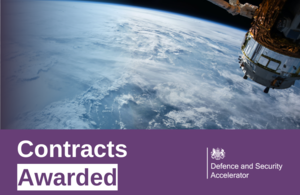£1 million in contracts awarded to enhance the UK’s space capabilities
Secured through the Space to Innovate Campaign – Bravo Drop, five innovative organisations have won funding to develop technologies that enhance the UK’s ability to safely operate in space

- £1 million overall funding allocated to five innovative organisations to develop space technologies
- Funding achieved through the Space to Innovate Campaign – Bravo Drop, a joint collaboration between the Defence Science and Technology Laboratory (Dstl) UK Space Agency and Defence and Security Accelerator
- The Space to Innovate Campaign aims to find and fund solutions to major space hurdles to promote space resilience and operational effectiveness
- The Space to Innovate Campaign – Bravo Drop is the second ‘challenge drop’ as part of the Space to Innovate Campaign
The Defence Science and Technology Laboratory (Dstl), UK Space Agency and Defence and Security Accelerator (DASA) are pleased to announce that five innovators have won £1 million in funding to develop technologies for the space domain.
The funding was achieved as a result of Space to Innovate Campaign – Bravo Drop which invited innovators to submit their innovative technologies and solutions to help overcome the following challenge areas:
Challenge 1: Novel sensing and Intelligence, Surveillance & Reconnaissance (ISR) technologies
This challenge sought to develop technologies and demonstrations of novel sensing modes for the space domain for military and intelligence applications; both space-to-ground and space-to-space.
Challenge 2: Novel approaches to improve signal-to-noise performance of space-related communications, sensing, identification or tracking capabilities
This challenge sought to identify novel technologies, techniques, processes or algorithms that offer improvements to the overall signal-to-noise characteristics of electromagnetic systems used for Defence and / or Security space domain applications.
Air-Vice Marshal Paul Godfrey, Commander, UK Space Command, said:
“This is an exciting time for the UK’s space sector. It’s great to see companies across the union continuously challenging the norms and improving the UK’s ability to operate effectively and safely in space through innovative technologies.
“Bravo Drop is the next part in the collaboration between Government, Defence, and industry and is crucial to our mission to make space safe, secure, and sustainable for all generations.”
Dr Mike O’Callaghan, Dstl Space Programme Manager, said:
“This is a hugely exciting time for Dstl with the launch of two satellite missions from the UK later this year. Accelerating the development of these technologies could enhance future space operations and contribute to improved space domain awareness, as well as more secure communications. We look forward to working with all the winners.”
Blast off to the winners
Five projects have been awarded Space to Innovate Campaign – Bravo Drop funding to fast-track their novel ideas. The winners are:
AltaRange Ltd
Bravo Drop funding: £117,700
AltaRange Ltd’s project aims to demonstrate the technical and commercial viability of a Space Surveillance and Tracking (SST) service for next generation space operations involving spacecraft in proximity to one another, to enable better in-space reconnaissance and spacecraft monitoring.
Slipstream Engineering Design Ltd
Bravo Drop funding: £ 199,054
This project aims to deliver an Adaptive Radio Platform (ARP) for space applications through the development and integration of a Software Defined Radio (SDR). This will enable flexible radio products that focus on efficient technologies which are power and spectrum scalable.
Fraunhofer UK Research Ltd and Fraunhofer Centre for Applied Photonics
Bravo Drop funding: £318,152
This project aims to develop innovative robust, high-reliability and low-SWaP (size, weight and power) hybrid photonic integrated circuits (PICs), which will enable technology for space-based optical clocks and quantum sensors.
Astroscale
Bravo Drop funding: £ 196,466
Astroscale’s project aims to determine the utility of hyperspectral imaging/multispectral imaging (HSI/MSI) capability for novel space-to-space (S2S) imaging applications, which is essential for intelligence gathering and threat assessment.
AVoptics Ltd
Bravo Drop funding: £195,920
This project aims to develop a novel, high-gain and low-noise optical photodetector material to realise higher-speed/longer-range Free Space Optical Communication (FSOC) links, to enable inter-satellite and satellite-to-platform high bandwidth communication.
What is the Space to Innovate Campaign?
The space domain, which includes satellites and space-based services, is vital to modern life, enabling a range of civilian and military activities. Any form of disturbance to UK space capabilities, whether that is natural or intentional, can cause a severe disruption to UK prosperity.
The Space to Innovate Campaign seeks proposals that can maintain the UK’s freedom of action in the space domain by developing future space technologies that enhance and protect space military and civil potential.
The campaign format is unique from other DASA competitions and comprises space-related challenges that are released periodically.
What happened in the Space to Innovate Campaign – Alpha Drop competition?
The Space to Innovate Campaign – Bravo Drop follows on from the Alpha Drop, where £1.6 million worth of contracts were awarded to:
- EESE, University of Birmingham
- Goonhilly Earth Station Limited
- Spectra Medical Limited
- University of Warwick
- University of Strathclyde
- 14 AI Innovation LLP
- University of Strathclyde
- Rocket Communications
The Space to Innovate Campaign – Alpha Drop aimed to identify visualisation tools to enable space operators to exploit information gathered from multiple data sources, and novel methods for characterising objects in space and their intent. Learn more here.